#buddhist science
Explore tagged Tumblr posts
Text
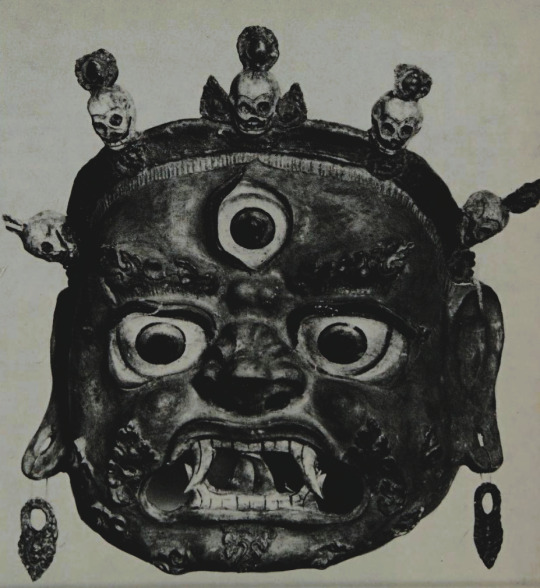
#tibetan buddhism#buddhist art#art#art history#mask#mahakala#buddhist#ancient#history#ancient civilizations#black and white#b&w picture#b&w#mythology#asia#asian#void#image#archeology#buddhist science#science#folk magic#folklore#magick#witchcraft
584 notes
·
View notes
Text

Sōjō Levan Fuu
#scifi#mecha#gundam#mobile suit gundam#gundam thunderbolt#mobile suit gundam thunderbolt#sojo levan fuu#levan fuu#psycho zaku#zaku#universal century#uc#gundam universal century#manga#gundam manga#manga art#buddhist#buddhist priest#buddhism#science fiction#south seas alliance
43 notes
·
View notes
Text
人性的“光”辉
//The Case for "Hikaru's" Humanity
This essay was originally a reblog/response to this post by chronicoverthinker.
I find the complexity of "Hikaru's" expression of love fascinating and nuanced enough for multiple interpretations. Hence, I wanted to put my thoughts out here in a separate post... for my own Garden's archive, to be honest! Hahahaha!
Anyway, I respectfully disagree with that post. Here's why.
Against The Case To Not Judge "Hikaru" As Though He's a Human
What I'm getting at from the bulk of the argument is that "Hikaru" cannot genuinely be described as aroace—or somewhere in the spectrum—because he's fundamentally not human.
I wanna push back on this. I think OP is not giving "Hikaru" enough credit.
The examples OP cited are either from the beginning—when he was very much 90% eldritch and 10% "cosplaying as a human"—or when he's still trying to grasp the deeper layers of being human.
Take his attitude with Asako discovering his secret(s).
OP is right that, during the first incident, "Hikaru" acted like a monster would. But in the second incident, "Hikaru" actually acted differently.
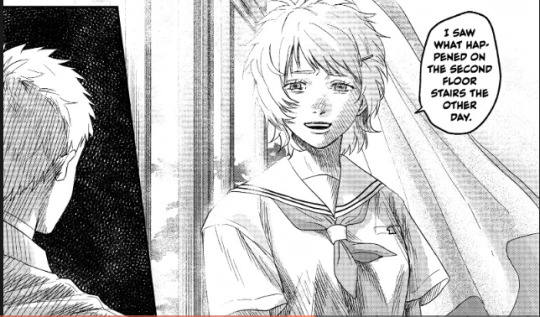
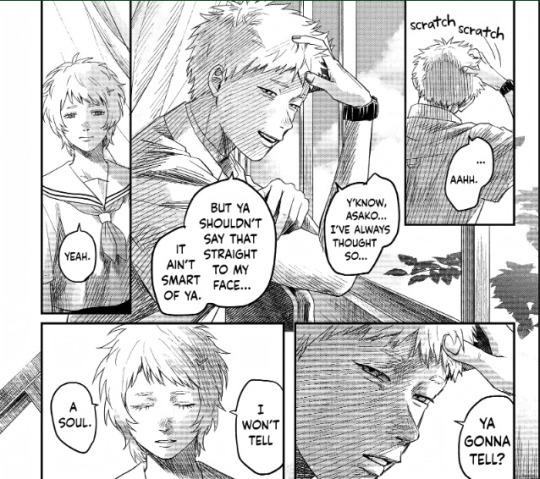
There was a brief moment of tension here—as if there was a split-second clash in "Hikaru's" mind that we aren't privy to. This is related to what I wanna talk about later.
For now, though, this is what happens a little while later... after Asako expresses her grief for the dead Hikaru.
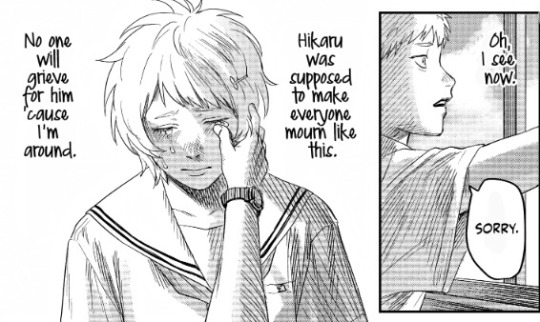
Here, "Hikaru" philosophizes what it means to be a living being who sees death as a totality.
And while he's doing that—
He reached out and wiped the tears off Asako's face.
Bear in mind that "Hikaru" had only shown his most unambiguous benevolence to Emoshiki for a long time, but here, he's showing similar care and benevolence to a friend. A non-Yoshiki human.
That's not all. He also expresses similarly subtle humanity in his interaction with that Medium Ajuma/Auntie (I forgot her name even though I liked her a lot ahahhaha). He values her advice and looks up to her for counsel, contrasting the first time he learned of her existence through Emoshiki's phone. The latter was when he was still mostly a monster; the former was as "Hikaru" steadily gained humanity.
I want to also point out that "Hikaru's" gains are parallel to Yoshiki's losses. Emoshiki is starting to be registered as "not entirely human/living". He is starting to feel the effects of torii gates acting as barriers, for example.
But if we're talking about the thematic confirmation of "Hikaru's" change in his personhood, I think there is an even better one in the manga.
---
The Emergent Dual nature of "Hikaru," Visualized
Above all else, I think nothing illustrates "Hikaru's" clash between humanity and monstrous nature than this panel shown here by my (very one-sided) bro, Mokumoku Ren:
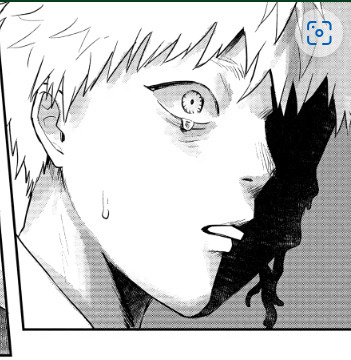
The panel before it was this:
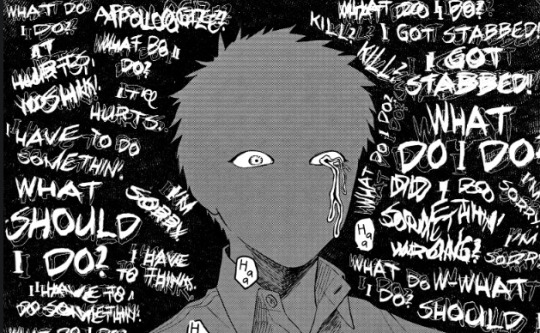
The left side of "Hikaru" shows his Eldritch nature. The tendrils that clue us of his monstrosity are leaking out.
The right side, however... shows a single human tear. The side where he was simply crying as an emotionally hurting human being.
Even the words on the second panel have subtle hints of that duality. Notice that the "monster side" has the word "Kill? Kill?!" While the human side has "it hurts""I have to do somethin'" and "apologize."
The two sides share words, for sure, but when I read it, my immediate understanding was that
the monstrous side is reacting, hence it comes out first. It's automated; the default state Eldritch-bro has been in for many years.
The human side is responding, hence the tears coming out later than the tendrils.
One is "Hikaru's" default, dominant nature. The other? His gained humanity and his budding capacity for self-reflection.
Later in this chapter, we actually see "Hikaru's" humanity—in an unambiguous telling—winning against his default-dominant nature: he chose to respond instead of react. He gave half of his monstrosity to Yoshiki so he could be more human than monster from that point onward.
-----
"I Love You, Yoshiki."
This is how it was played out in Chapter 1.
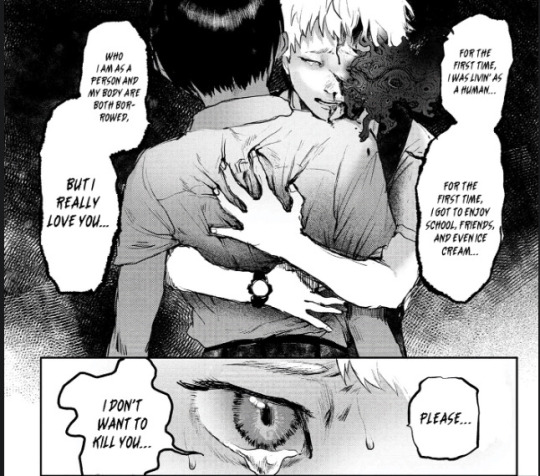
----
And this is how it plays out in Chapter 26.
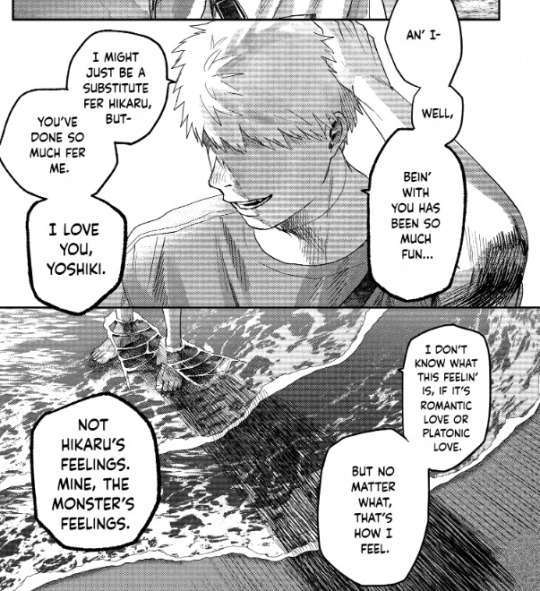
In both instances, "Hikaru" makes allusions to how fun being human is for a monster like himself. However, his reasons in the first chapter were superficial ("I have friends! I ate ice cream!"). The second panel, meanwhile, was thoughtful and earned.
You even notice how the first panel's "Hikaru" insisted that he's as good as a real human, while the second—now wised up to what humanity really means—admitted to being a monster and a substitute in origin.
I think "Hikaru" has gained enough humanity to him at this point that, even his self-deprecative " [...] the monster's feelings" is more human than monstrous.
His previous emotions were never this deep; they were copies of OG Hikaru at best while he outwardly insists he's so-totally Hikaru. But here, despite admitting that he really is "just a monster pretending to be human," he displays the sort of realization only a monster who finally gained humanity is capable of discerning. He's experiencing the nuances of a human's thought process, even noting his own lack of understanding concerning love.
This is why I disagree. I think "Hikaru" has enough human-ness to be reasonably considered aroace, at least at this point.
"Hikaru's" inability to understand love, even in terms of familial love or platonic love, is similar to my own. Nonetheless, there are still two dear friends I care a lot about, in a manner similar to how "Hikaru" feels for Yoshiki.
In other words: the way I understand "Hikaru's" declaration of love—per my own subjective experience as an aroace—is that he is expressing "care."
This gets us to the next point I'd like to make.
------
"Hikaru's" Love for Yoshiki isn't Expressed in Hunger
You're right; "Hikaru" hungers for Yoshiki. The exploration and reading of that hunger deserves its own analysis, but briefly, I see it as a metaphor for addiction (or even the violence of mental illnesses?), which can be intertwined with feelings like love.
No matter what it could be read as, though, if "Hikaru's" love for Emoshiki is just hunger masquerading as love, then there is little sense why "Hikaru" would express his love by putting distance between himself and Emoshiki.
His psychological journey up to that point on the beach centered around one question,
"What is the best thing to do so Yoshiki doesn't get hurt (by my monstrous side)?"
In other words, "What is the best thing for me to do so the person I love doesn't get hurt by my addiction/episodes?"
"Hikaru's" love is expressed in his commitment to Emoshiki's well-being. It is how he recognizes the danger of his monstrous hunger. As we've discussed earlier in this post, "Hikaru" is grappling with the duality of his personhood.
I think he is experiencing both care (which is "Hikaru's" version of love, maybe?) and hunger when it comes to Yoshiki.
These two desires interplay with each other... but are also at odds with one another. "Hikaru," being the battleground for these two sides, knows this very well. He also knows what's fueling these two things simultaneously, and chooses to let his care for Yoshiki lead his decision.
I don't think "Hikaru's" love refers to his hunger at all. I think they exist simultaneously, and we're watching this man-of-a-monster make a choice. Despite his origin, he's struggling with the human condition between not letting go out of "love," and letting go out of that same "love."
-----
Conclusion
There is definitely an element of subjective reading here, but I think "Hikaru," at this moment, can be judged as human (and, while we're at it, aroace).
He's got enough humanness that he can be judged through the lens of humanity (though I also agree that one can also choose not to do so, ahahha!).
His inability to understand the sentimentalities of families and friends is not a strong argument for the case of "Hikaru" not being "human enough."
"Hikaru's" love does not equal his hunger. They are not the same sentiments, though they do intermingle and influence one another like all webs of emotions do.
This post may seem like it's about "Hikaru's" sexuality and romantic orientation, but the bigger point I want to argue about is actually "Hikaru's" humanity. I hope to present a different angle to what "Hikaru's" psychology might be about.
-----
I wanna end this with how Yoshiki reacts to "Hikaru's" decision.
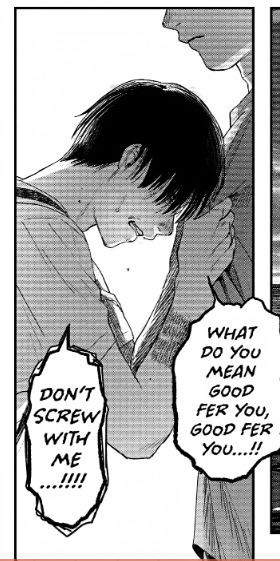
The prominence of his wounded arm in the panel and the intensity of his rejection toward "Hikaru's" decision, to me, seems like a quiet echo to how "Hikaru" —90% Eldritch, 10% cosplaying as human—began at first.
The one who's expressing a clinging attachment... is now the human who's starting to gain little supernatural, monstrous elements to himself.
---
Thank you for reading my ramble!
#the summer hikaru died#hikaru ga shinda natsu#indou hikaru#tsujinaka yoshiki#光が死んだ夏#光逝去的夏天#Philosophically horror (HikaNatsu)#FINALLY. CROW. RIGLESS PRINCE. NUKES. WITNESS THE FIRST ESSAY THAT ISN'T JJK OR TYE#Next to Buddhism and Science our favored angle really IS “nonhuman humanity” ahhahahha#Not a single mention of Buddhist Philosophy in this? MAD DISCIPLINE#Like bruh I could sneak in a whole spiel about kamma/karma but that's actually better left for another essay#oh how about the 6 realms of samsara ahahhahahah#how about the paramitas#NO LYN. NOPE.#Anyway HikaNatsu has finally joined the Lyndisian pantheon of earning a single essay. Its place in this garden has been ESTABLISHED.#I haven't even finished my actual job yet TODAY IS THE DEADLINE AHAHAHHAHA
19 notes
·
View notes
Text




From: Transactions - The Royal Society of Edinburgh. Edinburgh: Royal Society of Edinburgh, vol. 9. 1823.
Q41 .E2 v. 9
#spectrum#science#illustration#hand colored#orkney#hailstorm#maps#fata morgana#mirage#greenland#india#buddhist#hindu#art#history#libraryofva#specialcollections#rarebooks#19thcentury
18 notes
·
View notes
Text
Religion, Science, Wonder and Why
The purpose of religion is not simply to provide poetic “why’s” to science’s “what’s” and “how’s.”
While religious thinking and practice is primed for poetry, it is most healthily applied not as a left-over, fill-in-the-blanks creative modality, but as a force for turning one’s attention toward the actual questions that undergird the “why’s,” thereby creating space for the wonder and intimacy of unknowing to manifest.
~Sunyananda
#zen#buddhism#buddha#buddhist#dharma#enlightenment#sangha#awakening#nirvana#spirituality#religion#science#why
2 notes
·
View notes
Note
well it was a good rant!
i was wondering if you re buddhist? bc of the way you talk about the jedi as monks and your feelings about that, but i don't want to assume anything ,:)
yes and no, i would say. discovering and learning about vipassana or insight meditation saved my life in college, and it opened up a path of wisdom that had previously been closed to me. the spiritual practice has been more and less present in my life at different times over the years, and i am currently living in the middle of nowhere and so i'm not active in a particular dharma community. i've meditated a lot (at times), and have a few different favorite teachers, both current and former monks, whose books i've read and lectures i've listened to that have been very formative, like pema chödrön or rodney smith at SIMS for example. so i am not a religious person, but have been deeply shaped by buddhist wisdom and have respect for buddhist cultural traditions, let's go with that.
#more buddhist than your average bear#but not much#i was raised secular pro-science with lots of comparative religion study#my dad is a hippie lmao but he wasn't very present in my life#i had to come to the practice myself#personal
20 notes
·
View notes
Text
waiting for the day i become a pet in all sense of the word
#feminism has left my body because of my science exams#it’s all i’m a woman in stem until you have multiple open windows for your literature review#if anyone’s looking for a primary bread loser i know somebody (myself)#feed me regularly let me sleep and stroke my hair that’s all i ask#why did god make me human and not a house cat#i’m buddhist
2 notes
·
View notes
Text
The Mismatch
On average, it takes about 1/10th of a second from receiving the sensory signals to triggering a neural pattern. That is happening about 10 times a second. Each signal is a burst of electrical-chemical and each signal is new! In other words, after a neural pattern is triggered, the system is reset back to zero. There is no accumulation. We are looking at something entirely different from what we saw just moments ago!
The evolutionary purpose for our neural speed is the flexibility to change our focus at a moment of danger and this will greatly improve our rate of survival. Also, this speed at 1/10th of a second gives us the ability to notice and to track fast moving objects and animals. We collect information so much faster than the speed of most dangerous situations and animals!
Our emotional and physical body’s reactions are vastly slower. Almost a second! Every time we get a new neural pattern, it stimulates an emotional response. Eventually, there is an accumulation which becomes our memories.
If our emotional reaction was set to equal the speed of our neural network, then there would be no accumulation. We would always reset our emotional reaction back to zero.
For example, this is the process: the first time you see something, your emotional reaction is, “That’s nice. That’s lovely”. Within 1/10th of a second, another neural pattern and now we have added, “That is very lovely. Quite beautiful!” Then comes along another neural pattern and our emotional reaction is now, “That is so beautiful, it would be lovely to have.” Then comes another neural pattern and now our reaction becomes, “It is so beautiful, I desperately want it now! I am going to take it”. This emotional reaction becomes a long-lasting memory to the neural pattern! Our emotional reaction keeps building till a maximum level of intensity is obtained!
All this from the mismatching of the two processes. If our emotional reaction is 1/10th of a second, then we would always reset our emotional reaction back to zero, the original setting, and the highest level we would have is, “That’s nice. That’s lovely”. No emotional desires and wants. Our memories would be on this level, “That’s nice” and not on the “It is so beautiful, I desperately want it now! I’m going to take it!”
This is our biological process and our birth into sin!
The resetting of our emotional reaction to zero, to match our neural network, is enlightenment! This is spiritual growth and development! Of course, our “reality” of our perception is physical and is the same process as our biological emotional reactions. At 1/10th of a second, we have a different sensation than from the accumulating effect after many neural network patterns, say 10 of them, that this chair is solid, hard, and can hold my weight! At 1/10th of a second, we would be having a different perception!
When we reset our physical body’s reactions to the neural network speed, we will have a completely different and more truer view on reality!
#emotions#desires#consciousness#brain intelligence spiritualism religion truth science meaning of life death enlightenment self-awareness#spiritual#meditation#buddhism#buddha#buddhist#hindi#hindu#hinduism#Christian#gnosis#gnosticism#gnostic#mysticism#mystic#Taoist#tao#taoism#dao#daoist#daoism#God#atheist#atheism#truth#reality
2 notes
·
View notes
Text
Instruction, observation, and experience. by Trevor Leggett
Enquiry, too, can become a sort of slogan, as blind faith can become a slogan. Instruction, observation, and experience. by Trevor Leggett http://wp.me/pFy3u-uo
A pupil of a Zen master in Tokyo attended his sangha where it was expected that the students penetrate deeply into truth, in the world and in themselves. This particular pupil had to go to the countryside on a business trip, and he stayed overnight. He attended a service in the local temple. When he returned, he saw the teacher and one or two of his fellow pupils and he said, ‘You know — oh, it…

View On WordPress
4 notes
·
View notes
Text
Daily writing promptHow much would you pay to go to the moon?View all responses The idea of travelling to the moon has fascinated humanity for centuries. Since the first successful moon landing in 1969 (the year I was born), the notion of ordinary people journeying to this celestial body has transitioned from a far-off dream to a more tangible possibility with technological advancements and…

View On WordPress
#attachment#Buddhism#buddhist wisdom#curiosity#dailyprompt#dailyprompt-2102#education#exploration#fight capitalism#healthcare#knowledge#moon#moral concern#necessities#principles#Raffaello Palandri#science#Stoicism#Technology#value
1 note
·
View note
Text
https://youtu.be/fsySghJgkDk?si=xHd-_3nhLj8FHml2
#duolingo#educhums#grading#lesson plan#grammar#etymology#teacher#school system#teaching#langblr#Buddhist#buddhateachings#buddhism#SpiritualWealth#singapore#science#my sewing
0 notes
Text
seeing oomfs (not even on here but on twt too) shit on my beliefs makes me so sad :( obviously not everyone has to believe in the same stuff but i’d like to imagine ppl would be respectful at least
#buddhists and yogis don’t really have a lot of science backing them up#but when something has hundreds of years worth of results#why question someone for believing in it#plus the reason there is not scientific evidence is because they only really began studying buddhist and yogic practices in like the 70s
0 notes
Text

August 16, 2023:
I didn't see that ending coming for sure, but the rest of it kicked ass. Nonstop action: ghosts, dinosaurs, hallucinations, time slips, impending medical diagnoses, bratty rich people, a (possible) murder mystery... don't blink or you might miss something.
8/10 #WhatsKenyaReading
#whatskenyareading#books#reading#library#lgbtq+#sci fi#science fiction#time travel#time stop#nirvana#buddhist#dinosaur#velociraptor#trillionaire
0 notes
Text
Nick Polizzi talks about Thich Nhat Hanh and Zen Buddhism and offers a prayerful practice
When I opened my email today from Nick Polizzi and The Sacred Science, I stopped and read this with prayerful intention. It’s been one of those days. This is helping: “Hi Sheila “Spiral Sister” Murrey, Last year, one of the most influential Zen masters of our time, Thich Nhat Hanh, departed his physical body at age 95. Lovingly known as the “father of mindfulness,” his wisdom lives on and…
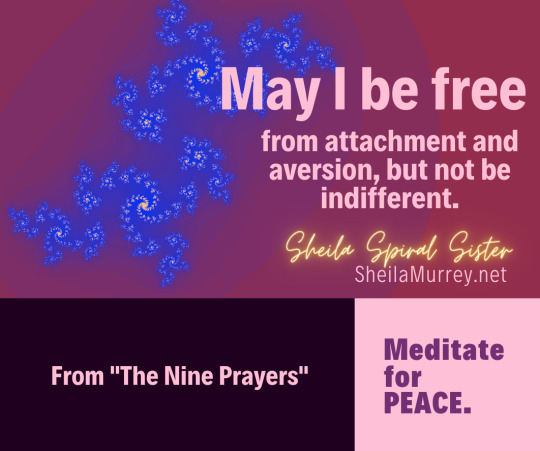
View On WordPress
0 notes
Text
Depth Psychology, Religion, and Breadth
In depth psychology, we frequently note that the best preparation for being a clinician is the widest possible education, not just in the sciences, but also in the humanities.
One needs to be exposed to, and conversant with, the fullness of life and the potential for human experience to be capable of authentic presence and meaningful interpretation.
The Roman playwright Terence once aptly wrote “I am human, and therefore, nothing human is alien to me.” When one can truly broach this threshold, they might be capable of authentically attending to (and even understanding) the varied meanderings of the human condition.
Definitely the same can (and should) be said of religious professionals.
Any religious schema taken on its own accord, that is, standing alone and generally imbued with an aura of uniquity with regard to the quality of its claims, and its capacity for discerning and conveying existentialist “Truth,” runs the risk of becoming utterly bankrupt- drunk on its own juice, and belligerent toward reality.
Therefore the German progenitor of the “science of religion,” Max Muller once rightly proclaimed that “He who knows one [religion], knows none.”
Assuredly religious adherents, professionals and laity alike, must be deeply committed to the metaphors and narratives of their religious tradition, so as to discern and apply the wisdom to be found at its heart. But, first, they must be able to authentically approach them as such, i.e. interdisciplinary assertions usually approximated in multiple cultures and times, in ways that can broaden one’s appreciation for their own preferred set of rituals and dogmas when examined in such context.
~Sunyananda

#zen#buddhism#buddha#buddhist#dharma#enlightenment#sangha#awakening#nirvana#spirituality#religious#religion#psychology#humanities#art#science
7 notes
·
View notes
Text
FINE since yall want an actual poll instead of a shitpost
this is a poll about COMMUNAL NORMS and CULTURAL COMMUNICATION it is not about whether you personally worship at the altar of modern science
877 notes
·
View notes